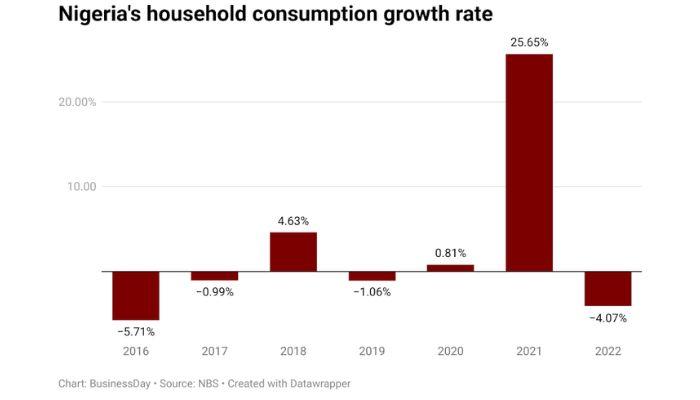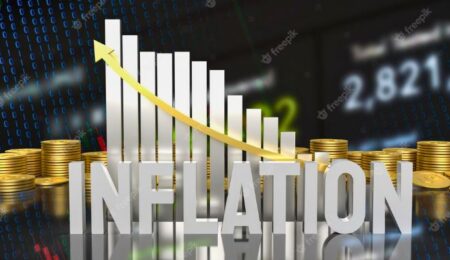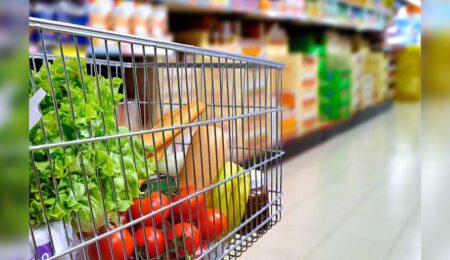Surging prices of goods and services in Africa’s most populous country have pushed household consumption expenditure to the lowest in six years.
Nigeria recorded a negative real annual growth rate of household consumption expenditure of 4.07 percent in 2022, down from 25.65 percent in 2021, according to a report by the National Bureau of Statistics (NBS).
Household consumption accounts for the largest share of real Gross Domestic Product at market prices. It consists of expenditure, including imputed expenditure, incurred by resident households on individual consumption goods and services.
Further analysis of the report also shows that the contraction recorded last year is the first since 2019, when household consumption shrank by 1.06 percent.
“This contraction is largely a result of the inflationary pressures we had in most of 2022. Between the second and fourth quarter, inflation kept rising, which affected household consumption,” Damilola Adewale, a Lagos-based economic analyst, said.
He said when inflation accelerates, the prices of goods and services increase, and the impact is always more telling on the low-income earners and the vulnerable segment of the economy.
“It now means that to maintain a decent standard of living, they have to incur more costs and reduce their consumption rate or the way they spend their money,” he said.
Uchenna Uzo, a consumer expert and faculty director at the Lagos Business School, said inflation, which is at its highest level in 17 years, has led to higher product prices. “There was more rationalisation in spending last year.”
Inflation in Africa’s biggest economy has been at a 17-year high since July last year, owing largely to the fallout of the Russia-Ukraine war and worsening insecurity.
In April 2023, it rose for the fourth consecutive time to 22.22 percent from 22.04 percent in the previous month, according to the NBS.
Food inflation, which constitutes 50 percent of the inflation rate, rose to 24.61 percent in April from 24.45 percent in the previous month.
The NBS report also revealed that in 2022, the compensation of employees, which is wages and salaries, declined to 4.41 percent from 13.68 percent in 2021.
Incomes are not rising as fast as the rate of inflation, said Gabriel Idahosa, deputy president of the Lagos Chamber of Commerce and Industry.
“So households are reducing their consumption of several goods and services. Everything is being reduced just to make sure they can stretch their income for the periods,” he said.
A recent report by Phillips Consulting Limited said that over 90 percent of Nigerians aged 18 or older have experienced an increased cost of living, thus reducing their spending on essential and non-essential items.
“As living costs continue to rise, low-income households are disproportionately affected, with many being forced to cut back on essentials,” it said.
It added that this situation is causing a decline in living standards, which hurts physical and mental health and exacerbates existing conditions.
Apart from consumers, the rising inflation has also affected businesses, especially in the manufacturing sector as their inventory of unsold finished goods rose by 22 percent to N469.7 billion in 2022 from N384.6 billion in 2021.
Read also: 90% of Nigerians cut back on spending as inflation surge – Survey
According to Segun Ajayi-Kadir, director-general of the Manufacturers Association of Nigeria, the high inventory recorded in the period is attributed to low purchasing power in the economy due to the declining real income of households following the continuous increase in inflationary pressures in the country.
Last year, the World Bank said Nigeria’s accelerated inflation growth had eroded the N30,000 minimum wage by 35.5 percent and widened the poverty net with an estimated five million people in 2022.
In its latest Nigeria Development Update report, the multilateral lender said the higher inflation in 2022 was estimated to have pushed an additional five million Nigerians into poverty between January and September 2022, mainly through higher prices of local staples- rice, bread, yam, and wheat, especially in non-rural areas.
“Between 2020 and 2022, for instance, the inflation shock has pushed an estimated 15 million Nigerians into poverty,” it said.
The report highlighted that the minimum wage, which was $82 in 2019, had dropped to $26. “Consumer price inflation had heightened, making it one of the highest in the world,” the World Bank added.






